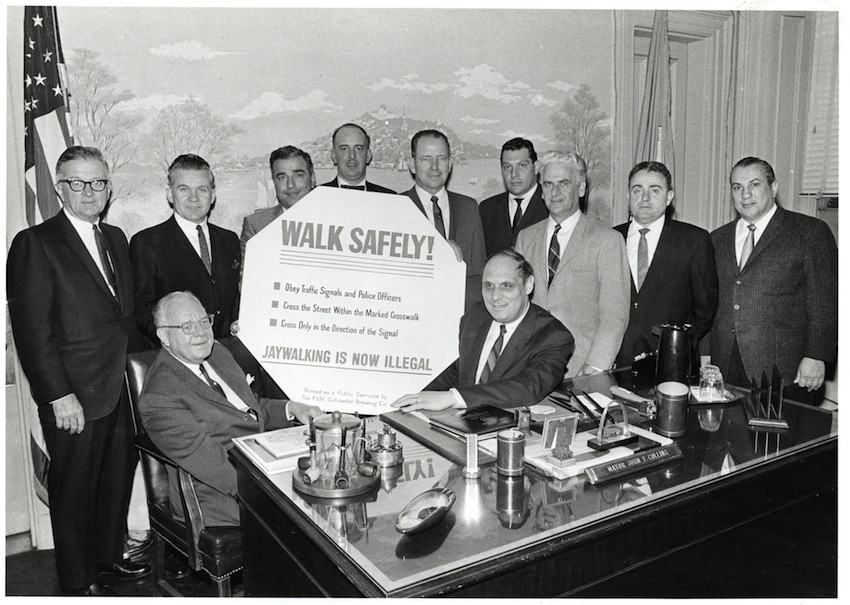Why Wouldn’t You Jaywalk in Boston?

Image by City of Boston Archives on Flickr
Tuesday on Twitter, the popular account @WhattheFFacts (as the name implies, it regularly tweets out facts that make you say “What the F”) reminded us of one of the stranger truths about Boston:
The fine for jaywalking in Boston is $1.
— What The F*** Facts (@WhatTheFFacts) July 22, 2014
Actually, the jaywalking fine is statewide. The Massachusetts General Laws Chapter 90, Section 18A states that municipalities can fine pedestrians who break jaywalking rules “by a fine of one dollar for the first, second or third such offense … and by a fine of two dollars for the fourth or subsequent such offense so committed in such calendar year.”
That’s right. Get caught jaywalking four times and you’ll have to shell out two whole dollars. But it’s unlikely you’re going to get stopped that frequently. In fact, it’s unlikely you’ll get stopped even once. It would likely cost communities more to process your violation than you would pay them in fines.
Why is it so cheap? Hard to say, but it seems that communities set the fine at $1 when it was a more substantial slap on the wrist, and they just haven’t raised it since. In the 1960s, Cambridge had a public education campaign to tell residents that they would begin enforcing the $1 fine, suggesting people might actually have cared. Now, the public might be a little irked to see the fine raised. According to the Boston Globe, only 12 percent of pedestrians obey “Walk” signals at crosswalks. We’re all jaywalkers here.
Meanwhile, cars that don’t stop for a pedestrian in a crosswalk are subject to a $200 fine. Given how much car drivers complain about scofflaw cyclists, you think they’d have a bit more umbrage about all this. But, of course, there exists a higher law than the Massachusetts General Code: the law of physics. In that realm, punishments for an errant jaywalker who gets hit by a car are generally much graver than the punishment for the driver who hits a pedestrian.
Nevertheless, Boston residents seem to embrace the practice wholeheartedly, it’s as if we invented jaywalking. And actually, in a way, we did. The Boston Globe reported that the term might have gained popularity right here:
“The Bostonian . . . has reduced a pedestrian who crosses streets in disregard of traffic signals to the compact `jaywalker,’ ” reads a 1917 Harper’s Magazine article, according to Random House’s dictionary division. Back then the word jay was used to describe someone who was unsophisticated, naive, or foolish something we still might call a jaywalker today.
Unsophisticated, naive, foolish…perhaps. But one thing we won’t say about them is that they’re taking a big financial risk by crossing the street where they will.


